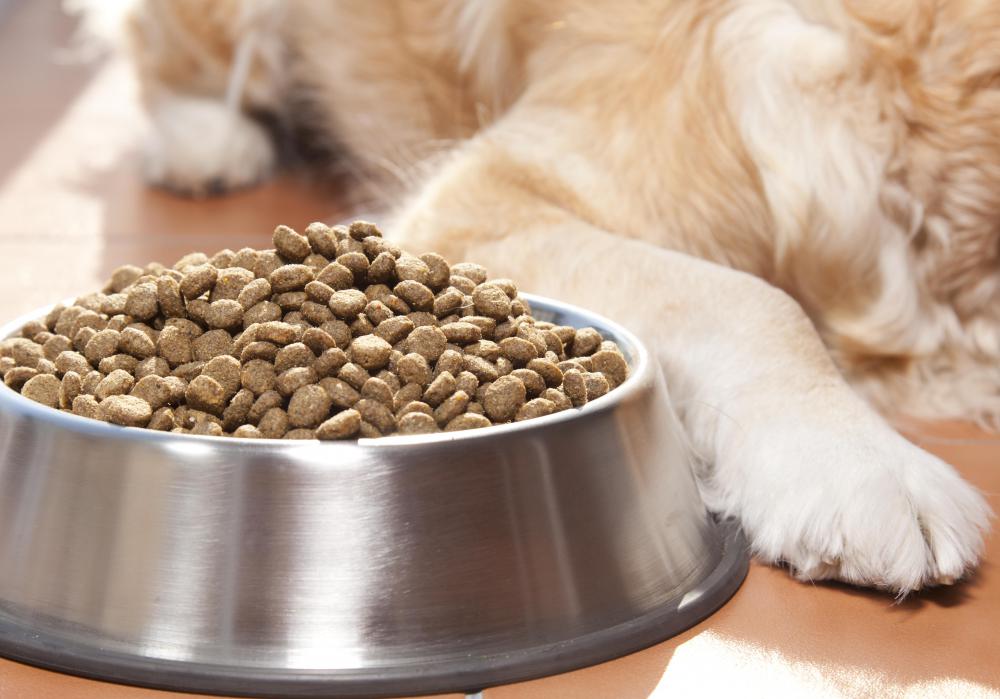At AllThingsNature, we're committed to delivering accurate, trustworthy information. Our expert-authored content is rigorously fact-checked and sourced from credible authorities. Discover how we uphold the highest standards in providing you with reliable knowledge.
What Is Canine Enteritis?
Canine enteritis is a disease of the gastrointestinal system in dogs. It is an inflammation of the intestines caused by the proliferation of many different types of bacteria or viruses and most often targets the small intestine. This disease is one of the most common ailments in the canine population, with any dog — no matter the breed, size or age — being susceptible to enteritis. Symptoms of canine enteritis include severe vomiting, diarrhea, blood in the stool, and abdominal cramping. This disease can be very serious, and dogs should be treated quickly by a qualified veterinarian.
Bacteria and viruses that are responsible for canine enteritis are often transmitted in situations where many dogs are in close proximity, such as shelters, kennels or dog parks. Transmission occurs either via direct contact, such as licking or smelling other dogs, or through close proximity to fecal matter. Most veterinarians recommend vaccinating against canine parvovirus, but as of 2011, there is no vaccine against rotovirus. Bacteria responsible for canine enteritis include Salmonella, E. coli and Staphylococcus. Viral causes include rotovirus and parvovirus.

Severe vomiting and diarrhea are the most common signs of enteritis. Frequency of stools will dramatically increase, and the stool will be very watery. Blood in the fecal matter indicates damage to the intestinal wall or irritation from the fast passage of waste through the dog's system. Dogs may be extremely lethargic, seem to be in pain, or refuse to eat or drink. While it may be difficult to tell where a dog is experiencing pain, the most common site is the abdominal area as a result of cramping.

If enteritis is suspected, an appointment should be made with a veterinarian for safety precautions. If certain signs are present, emergency veterinary care should be sought. These signs include severe diarrhea for more than 24 hours, difficulty breathing or very labored breathing, vomiting more than three times, or blood in the dog's stool. This disease progresses quickly, so it is not in a dog's best interest to wait and see it recovers alone.

Treatment for canine enteritis begins with making sure the dog gets plenty of rest. Food and water should be provided in limited quantities to allow the digestive tract to recover. Medication may be prescribed to reduce the amount of waste passing through the digestive tract, and fluids rich in important electrolytes may be offered. If the cause of the disease is bacterial, antibiotics may help the dog's recovery. In serious cases, intravenous medication may be required.
Frequently Asked Questions
What is canine enteritis and how does it affect dogs?
Canine enteritis is an inflammation of the small intestine in dogs, leading to symptoms like vomiting, diarrhea, abdominal pain, and loss of appetite. It can be caused by various factors, including viral infections like parvovirus, bacterial infections, parasites, or ingestion of foreign objects. Prompt veterinary care is crucial to manage symptoms and prevent dehydration.
What are the most common causes of enteritis in dogs?
The most common causes of enteritis in dogs include viral infections such as canine parvovirus and coronavirus, bacterial infections like Salmonella, parasites such as roundworms, and dietary indiscretion. According to studies, canine parvovirus is a particularly prevalent cause, especially in unvaccinated puppies and young dogs.
How is canine enteritis diagnosed?
Canine enteritis is diagnosed through a combination of clinical signs, physical examination, and diagnostic tests. Veterinarians may perform fecal examinations, blood tests, ultrasounds, or X-rays to determine the cause. In some cases, specific tests for viruses like parvovirus are used to confirm the diagnosis.
What treatment options are available for dogs with enteritis?
Treatment for canine enteritis depends on the underlying cause but often includes fluid therapy to combat dehydration, anti-nausea medications, antibiotics for bacterial infections, and anthelmintics for parasites. Dietary management with easily digestible foods is also common. Severe cases may require hospitalization for more intensive care.
Can canine enteritis be prevented?
Prevention of canine enteritis involves regular vaccinations, particularly against parvovirus and coronavirus, good hygiene practices, parasite control, and avoiding exposure to contaminated environments or infected animals. Feeding a balanced diet and preventing dietary indiscretion also play a role in reducing the risk of enteritis.
Is canine enteritis contagious to other dogs or humans?
Some forms of canine enteritis, especially those caused by viral infections like parvovirus, are highly contagious among dogs. However, most causes of enteritis are not transmissible to humans. It's essential to practice good hygiene and isolate infected dogs to prevent the spread of disease to other canine companions.
AS FEATURED ON:
AS FEATURED ON:













Discuss this Article
Post your comments